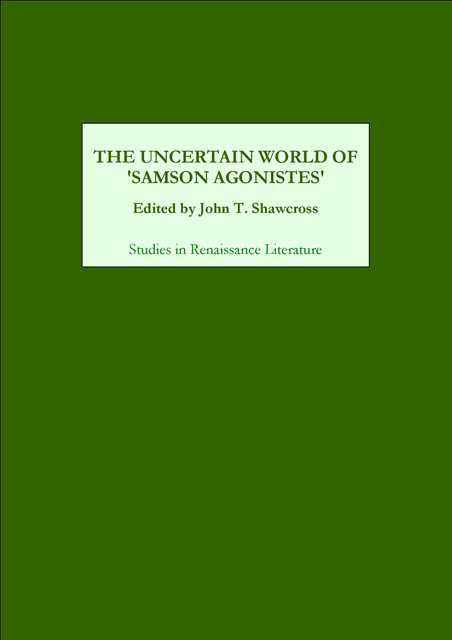Book contents
- Frontmatter
- Contents
- Preface
- Chapter 1 The World of Samson Agonistes
- Chapter 2 Uncertainty and the Text
- Chapter 3 The Dramatic Work and its Reading
- Chapter 4 Samson: God’s Champion, a Type, or Individual?
- Chapter 5 Dalila: Seductress or Wife?
- Chapter 6 Politics in the Destabilized Text
- Chapter 7 Biographical Intrusions
- Chapter 8 The Uncertainties of Irony
- Chapter 9 A Hermeneutics of the Text
- Chapter 10 Samson Agonistes and Consistencies of Belief
- Works Cited
- Index
Chapter 10 - Samson Agonistes and Consistencies of Belief
Published online by Cambridge University Press: 22 March 2023
- Frontmatter
- Contents
- Preface
- Chapter 1 The World of Samson Agonistes
- Chapter 2 Uncertainty and the Text
- Chapter 3 The Dramatic Work and its Reading
- Chapter 4 Samson: God’s Champion, a Type, or Individual?
- Chapter 5 Dalila: Seductress or Wife?
- Chapter 6 Politics in the Destabilized Text
- Chapter 7 Biographical Intrusions
- Chapter 8 The Uncertainties of Irony
- Chapter 9 A Hermeneutics of the Text
- Chapter 10 Samson Agonistes and Consistencies of Belief
- Works Cited
- Index
Summary
MANY years ago William Riley Parker remarked the “legend” that the career of John Milton as poet and prose writer exhibits an agenda of hopes for achievement that, one item after another, was completed without swerving from his determined course. While we can argue with that “legend” as far as his career is concerned, it does epitomize a consistency, even a pertinacious unswerving, of thought and of value in life and of belief in God. We may credit as the cause of his not following a ministerial career in 1632, when he was graduated from Cambridge University with a master of arts degree, that he did not receive a fellowship or a preferment for a parish living, or that he felt it incumbent to stay at his father’s house to care for his aging parents. Yet, as his letter in the Trinity MS addressed to an unknown friend relates, he felt he would not make a good preacher, and as the sonnet “How Soon Hath Time,” which he enclosed with that letter, indicates, he was, shortly before his graduation, uncertain of what he wanted to do in life or where his life would lead him. He is not rejecting ministerial and religious thought, only a clerical career; “All is … / As ever in [his] great task-maisters eye.” For Milton the prime thought motivating any of his actions generates from his belief in God and God’s omnipotence and omniscience and mercy.
“A Paraphrase on Psalm 114,” the earliest poem we have by Milton (apparently written in 1624), is a Passover psalm celebrating the miraculous action of God. As reference to Exodus xiv:21 reveals, comparison is made with the Lord’s separating the waters of the Red Sea so that the chosen people, the Israelites, could pass over to Canaan and escape the bondage of Pharaoh (metaphorically construed as Satan). God will act to help and save his true servants even against all seeming impossiblities, such as the waters of the Red Sea would render, normally blocking passage through it. Psalm civ depicts an event in the conquest of Canaan when the Israelites, bearing the Ark of the Covenant, pass over the river Jordan.
- Type
- Chapter
- Information
- The Uncertain World of Samson Agonistes , pp. 138 - 144Publisher: Boydell & BrewerPrint publication year: 2001

